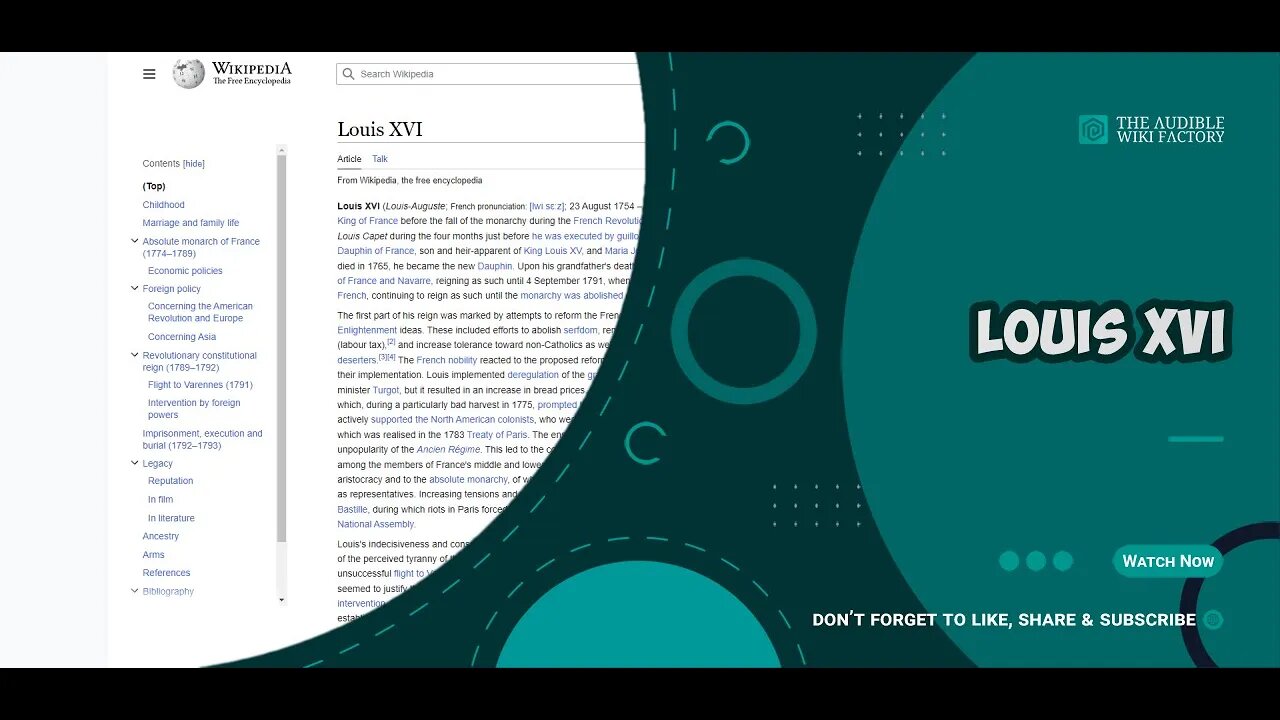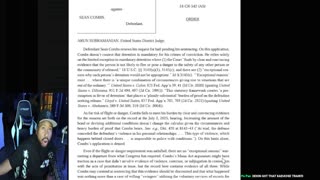Premium Only Content

Louis XVI was the last King of France before the fall of the monarchy during the French
Louis XVI was the last King of France before the fall of the monarchy during the French Revolution. He was referred to as Citizen Louis Capet during the four months just before he was executed by guillotine. He was the son of Louis, Dauphin of France, son and heir-apparent of King Louis XV, and Maria Josepha of Saxony. When his father died in 1765, he became the new Dauphin. Upon his grandfather's death on 10 May 1774, he became King of France and Navarre, reigning as such until 4 September 1791, when he received the title of King of the French, continuing to reign as such until the monarchy was abolished on 21 September 1792.
The first part of his reign was marked by attempts to reform the French government in accordance with Enlightenment ideas. These included efforts to abolish serfdom, remove the taille (land tax) and the corvée (labour tax), and increase tolerance toward non-Catholics as well as abolish the death penalty for deserters. The French nobility reacted to the proposed reforms with hostility, and successfully opposed their implementation. Louis implemented deregulation of the grain market, advocated by his economic liberal minister Turgot, but it resulted in an increase in bread prices. In periods of bad harvests, it led to food scarcity which, during a particularly bad harvest in 1775, prompted the masses to revolt. From 1776, Louis XVI actively supported the North American colonists, who were seeking their independence from Great Britain, which was realised in the 1783 Treaty of Paris. The ensuing debt and financial crisis contributed to the unpopularity of the Ancien Régime. This led to the convening of the Estates-General of 1789. Discontent among the members of France's middle and lower classes resulted in strengthened opposition to the French aristocracy and to the absolute monarchy, of which Louis and his wife Queen Marie Antoinette were viewed as representatives. Increasing tensions and violence were marked by events such as the storming of the Bastille, during which riots in Paris forced Louis to definitively recognize the legislative authority of the National Assembly.
Louis's indecisiveness and conservatism led some elements of the people of France to view him as a symbol of the perceived tyranny of the Ancien Régime, and his popularity deteriorated progressively. His unsuccessful flight to Varennes in June 1791, four months before the constitutional monarchy was declared, seemed to justify the rumors that the king tied his hopes of political salvation to the prospects of foreign intervention. The credibility of the king was deeply undermined, and the abolition of the monarchy and the establishment of a republic became an ever-increasing possibility. The growth of anti-clericalism among revolutionaries resulted in the abolition of the dîme (religious land tax) and several government policies aimed at the dechristianization of France.
In a context of civil and international war, Louis XVI was suspended and arrested at the time of the Insurrection of 10 August 1792. One month later, the monarchy was abolished and the First French Republic was proclaimed on 21 September 1792. Louis was then tried by the National Convention (self-instituted as a tribunal for the occasion), found guilty of high treason and executed by guillotine on 21 January 1793, as a desacralized French citizen under the name of Citizen Louis Capet, in reference to Hugh Capet, the founder of the Capetian dynasty – which the revolutionaries interpreted as Louis's surname. Louis XVI was the only king of France ever to be executed, and his death brought an end to more than a thousand years of continuous French monarchy. Both of his sons died in childhood, before the Bourbon Restoration; his only child to reach adulthood, Marie Thérèse,...
LINK TO ARTICLE: http://en.wikipedia.org/wiki/Louis_XVI
TAGS: Louis XVI, Legitimist pretenders to the French throne, Navarrese titular monarchs, Heads of government who were later imprisoned, Dethroned monarchs, 18th-century peers of France, Recipients of the Order of Saint Lazarus, Publicly executed people, Princes of France (Bourbon), Princes of Andorra, People executed for treason against France, French people executed by guillotine during the French Revolution, Leaders ousted by a coup, Knights of the Golden Fleece of Spain, Executed monarchs, Dukes of Berry, Dauphins of France, Burials at the Basilica of Saint-Denis, Ancien Régime, 18th-century Princes of Andorra, 18th-century kings of France, Louis XVI
#GeneralKnowledge #AudibleWikiFactory #Audible #Wikipedia #LouisXVI
-
 9:22
9:22
The Audible Wiki Factory
2 years agoThe Albuquerque International Balloon Fiesta is a yearly hot air balloon festival that takes
767 -
 16:28
16:28
Sugar Spun Run
22 hours ago $0.16 earnedTiramisu Cake
1.92K3 -
 1:01:48
1:01:48
Dialogue works
23 hours ago $2.48 earnedAndrei Martyanov: Trump Left Hanging - Russia's Cold Silence Sends a Message
43.6K12 -
 2:39:14
2:39:14
FreshandFit
11 hours agoOnlyFans Clout Chasers Said This And Got Kicked Off...
338K135 -
 2:12:28
2:12:28
Badlands Media
16 hours agoBaseless Conspiracies Ep. 144: NATO Narratives, Media Meltdowns & a Brightcore Boost with Kim Bright
122K22 -
 2:02:11
2:02:11
Inverted World Live
11 hours agoGiant Underground Blob Moving Toward NY | Ep. 85
56.9K22 -
 2:46:21
2:46:21
TimcastIRL
10 hours agoTexas GOP Greenlights ARREST WARRANTS For Dems Who FLED State | Timcast IRL
248K93 -
 3:16:50
3:16:50
Laura Loomer
10 hours agoEP137: EXPOSED: How Tucker Carlson Became Hunter Biden's Wingman
82.6K98 -
 4:22:34
4:22:34
Akademiks
9 hours agoNicki Minaj vs Dez Bryant. Trump Calls out Charlamagne. Diddy Denied Bail Again! ICEMAN soon?
68.1K3 -
 3:16:28
3:16:28
Nerdrotic
11 hours ago $10.69 earnedNerdrotic at Night 504
93.7K3